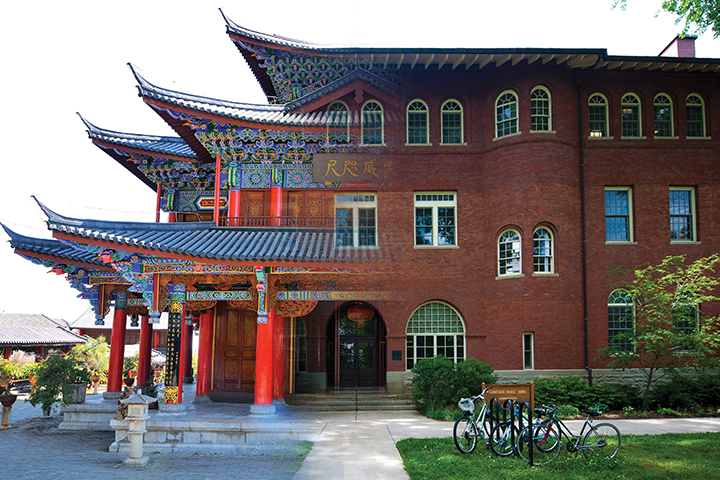Two idealistic Yale alumni—one Chinese, the other American—met in China nearly a century ago. They sparked an enduring friendship, laying the foundation for a three-generation legacy that stretched from rural China to Berea College in the hills of Appalachia. It all started during one of the most fascinating events in China’s history: the Boxer Rebellion.
In 1900, a secret group of Chinese rebels that became the Order of the Righteous and Harmonious Militia rose up against foreign emissaries, foreign missionaries and Chinese Christians. Dubbed “Boxers” by the foreign powers because of their style of martial arts, which they believed made them invulnerable to bullets, these rebels besieged China’s capital city. An international force of eight nations—led by Russia and Japan, and including the U.S.—ultimately defeated the Boxers, and China had to pay more than $330 million in reparations. The U.S. used the excess portion of its share of the reparations to establish a scholarship fund to educate young Chinese students in America.
One of the first students chosen for this scholarship opportunity was Fu-Liang Chang, grandfather of Berea College Trustee and Vice Chairman Robert Yahng ’63. In the early 20th century, Chang left China to attend Yale University on a Boxer’s Rebellion Indemnity Scholarship. That journey became the start of his family’s more-than-six-decade connection to Berea. While at Yale, Chang met his future wife, Louise Harriet Huie, a half Dutch/English and Chinese New York native, and decided on his life mission—to assist his countrymen in rural China in achieving a better life. Chang wanted to help restore hope and a more rewarding way of life to his people.
“As a result of revolution, civil wars and World War I, poverty, misery, famine, deprivation, sickness and death had become the lot of the Chinese people,” Yahng said about the condition of China during that period.
In 1915, Chang graduated from Yale, married Louise Huie, and together they moved to China. Believing education was the key to rural reconstruction, he joined Yale-in-China as a professor of botany and forestry and later served as dean of the middle school department. Yale-in-China was an organization started in the late 1800s by Yale graduates interested in mission work. By the early 20th century it had become focused on education and development.
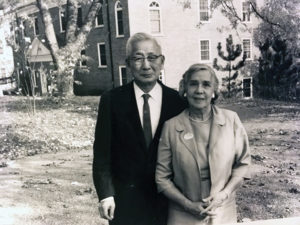
In the 1920s, he met Francis Hutchins, who was also on the Yale-in-China faculty. Hutchins had graduated from Oberlin in 1923 and later would also attend Yale, earning a master’s degree there in 1933. The two struck up a friendship that would last for decades. As China deteriorated from years of turbulence, Hutchins was called to leave the war-torn country and return to the United States to lead a small, liberal arts college in the heart of Appalachia, a college where his father William had been serving as president.
“Throughout 1938, the enemy [Japanese] planes visited Nanchang daily and sometimes twice a day, and we learned to live with them,” Chang wrote in his memoirs. “In fact, we even entertained visitors with the enemy screaming overhead. My friend and former colleague at Yale-in-China, Francis S. Hutchins, visited us before he returned to America to accept the presidency of Berea College. In the course of a nuisance air raid one night, one enemy plane flew over the city for more than two hours before dropping its load of bombs. I suggested to Dr. Hutchins that we go to bed as it was already rather late. After pondering what would be the safest place in the house, we all slept underneath our beds. No one could escape injury by a direct hit, but shrapnel would probably not touch us underneath an iron bed covered with mattress and blanket.”
In the coming years of World War II, China would be a major theater of action, as the Japanese invaded the country, causing chaos and disruption of society. After the end of the war, communists began the takeover of mainland China, resulting in continued upheaval.
“It is so difficult to reconstruct and help people when there is little structure or order in the nation,” Yahng said of the position in which his grandfather found himself during the late 1940s.
In 1949, Chang left China and accepted a fellowship at Yale Divinity School for the 1950-51 school year. While there, Hutchins invited his old friend to join the faculty at Berea College. Chang accepted the offer. He taught sociology and served as College host and counselor to international visitors from 1951 to 1969.
A Life’s Mission Redirected
Chang’s mission did not change when he joined the Berea faculty—it was just redirected. Having fled China, he realized that serving Appalachia—with its poverty and lack of resources—was well aligned with his life’s mission. Instead of helping farmers in rural China, he turned his attention to the similarly challenged population in Kentucky. Hutchins asked Chang to study the Pine Mountain Settlement School in Harlan, Ky. After his study report, titled, “Whither Pine Mountain,” Chang taught a course at Berea called Rural Reconstruction of Underdeveloped Areas. He continued to believe that investing time and resources in educating people is the best way to effect change. Berea’s mission became his mission.
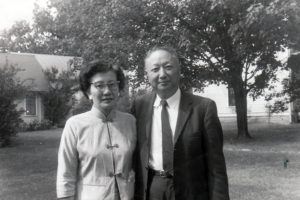
Through Hutchins’ and Chang’s friendship, Robert’s parents, Louise Chang Yang and Daniel Teh-en Yang, met and formed their own close bond with the Hutchins family. Daniel had earned his law degree from Soochow University Law School and a doctorate in juridical science (the equivalent of a Ph.D. in Law) from New York University. Louise graduated from Vassar College and earned a master’s degree from the University of Michigan. She spoke fluent English and Chinese and had proficiency reading French and Burmese. By the late 1940s, they had established themselves in China, as well. Daniel started his own law practice in Shanghai, only to have his office destroyed by Japanese bombs. When WWII ended, the civil war with the Communists resumed. He found work in the government of Nationalist China. In 1949, he was in charge of rationing for the capital city of Nanjing at a time of hyperinflation, deprivation and instability.
Daniel’s in-laws left China first, followed in 1950 by his wife, Louise, and their four sons—Robert, Huie, Chris and Michael. They all left for the U.S. as immigrants after the fall of Nationalist China. Daniel would remain in Taiwan for three years before joining his family in the U.S.
“All his life, he was in a situation where life and property could be and were easily lost,” Yahng recalled of his father. “My parents’ philosophy was simple: when everything is stripped from you, one thing that is very difficult to take from you is your education.”
When the Yang family arrived in the U.S., they had little material wealth, but their education and faith allowed them to survive. Yahng said his grandparents held tight to their Christian faith and values, and believed in Berea’s motto: God has made of one blood all peoples of the earth.
Two Generations, One Berea
In the U.S., Daniel furthered his education, earning an advanced degree in accounting and working for industrial companies as an accountant. Louise was a librarian at Yale’s Sterling Memorial Library. In 1957, at the invitation of Francis Hutchins, Daniel and Louise joined Louise’s parents, Fu-Liang and Louise Chang, at Berea College. Daniel first served as the College treasurer for several years and then as a professor in the economics and business department. Louise joined the College as a librarian at the Hutchins Library. She also taught general studies.
In Berea, the Yangs had found a refuge from the tribulations of war and social upheaval they had experienced in China.
“My mother was surrounded by family, close friends and colleagues. She found fulfillment in her work at the library,” Yahng recalled.
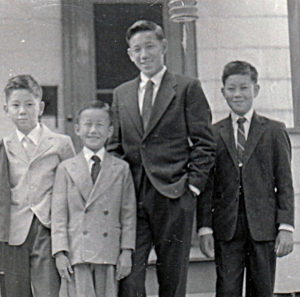
“My father truly loved being in Berea,” Yahng reminisced. “He had friends in Berea. Walking across the campus to collect his mail at the College post office would take a long time because every few steps he would meet a friend who would engage him in pleasant conversation. He took pleasure in flipping pancakes on Election Day morning. He enjoyed his involvement with Union Church.”
In 1980, when Daniel Yang passed away, flags in Berea flew at half-mast, and Francis Hutchins gave the eulogy at his funeral, which drew such a large crowd it had to be held at Union Church instead of in Danforth Chapel on Berea’s campus. Thinking back, Yahng says without the friendship between Hutchins and his grandfather, his family never would have been part of Berea College.
In 1959, Robert, the oldest of Yang’s four boys, began his personal Berea College journey as a first-year student. His brother, Huie, also went to Berea, graduating in 1966. Another brother, Chris, attended Berea Foundation School, and later graduated from the University of the South. Michael, the youngest of the four brothers, graduated from Knapp Hall and followed his grandfather’s example by earning his undergraduate degree at Yale University.
Apart from his family, Francis Hutchins was one of the biggest influences on Robert Yahng’s teenage and later years. The same man who had befriended his grandfather more than three decades prior took to sharing his knowledge and insight on life with Yahng.
“President Hutchins was a mentor,” Yahng said. “I learned a great deal from him and was guided by his wisdom.”
Much of Hutchins’ shared wisdom revolved around making good life choices.
“An example may be illustrative,” Yahng said. “He told me about his reunion in the early 1970s with an old Chinese friend whom he had not seen since leaving China in 1938. During the reunion, President Hutchins asked his friend how he had survived the decades of turmoil in China – WW II, the Chinese Civil War, the Great Leap Forward and the Cultural Revolution. After some thought, the friend replied, ‘My secret was, I never left a job I couldn’t return to.’ I have always remembered that.
“To me, it meant that life is all about options, and to exit situations gracefully preserves not only relationships, but options for survival, and success,” Yahng elaborated.
Continuing the Legacy
After graduating from Berea in 1963, Yahng received a juris doctor degree from the University of Kentucky College of Law in 1967. He then served in the U.S. Air Force, attaining the rank of captain before receiving an honorable discharge in 1972. In the years following his military service, he became a capital and managing partner for the international law firm of Baker & McKenzie. Yahng served 17 years as the chairman of the board of the pre-eminent civil engineering and construction company, American Bridge, a firm that has built a number of very well-known bridges. A current project is the replacement of the Tappan Zee Bridge over the Hudson River, just north of New York City. He continues to pursue his love of education both through his Berea service and by teaching (for the last 20 years) and serving on the board at Salesian College Preparatory in Richmond, Calif., a school that, like Berea, serves a highly- disadvantaged population. A member
of both the Kentucky and California Bar Associations, Yahng is also the co-author of several textbooks on U.S. history and government.
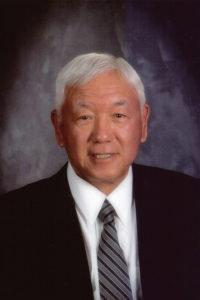
“I enjoy the interaction with my students and watching them learn,” Yahng said. “It gives me a great deal of satisfaction.”
Yahng’s connection to Berea expanded in 2003 when he joined the College’s Board of Trustees. In his 15 years on the board, he has worked together with the leadership of the College to ensure the institution can survive and remain viable and meaningful for all it serves.
“The board dynamic has been one where everyone pitches in in a team effort,” Yahng said. “There is a congeniality and spirit of constructive help. Everyone shares the same goal of making Berea College a better place.”
Yahng and his family are making Berea College a better place by supporting a new academic building under construction on campus. In memory of his parents, Yahng and his wife, Tina, have funded the Yahng Discovery Center in the Margaret A. Cargill Natural Sciences and Health Building, which is set to open this fall.
“I think the Discovery Center lends itself to the idea of being creative, being innovative and pursuing solutions to problems,” Yahng explained. “In this case, it’s a science building, but the idea of discovery isn’t limited to the sciences; it really extends to the social fabric of the whole world.”
It is important to Yahng that he maintains a close relationship to Berea for his family. He hopes that his family connection to Berea will continue in the following generations.
His broader hope is that more alumni will foster a multi-generational legacy with Berea, even if their own children and grandchildren do not attend their alma mater.
“Education impacts the lives of people, who, in turn, impact others,” Yahng said, “in making the world a better place for all.”


